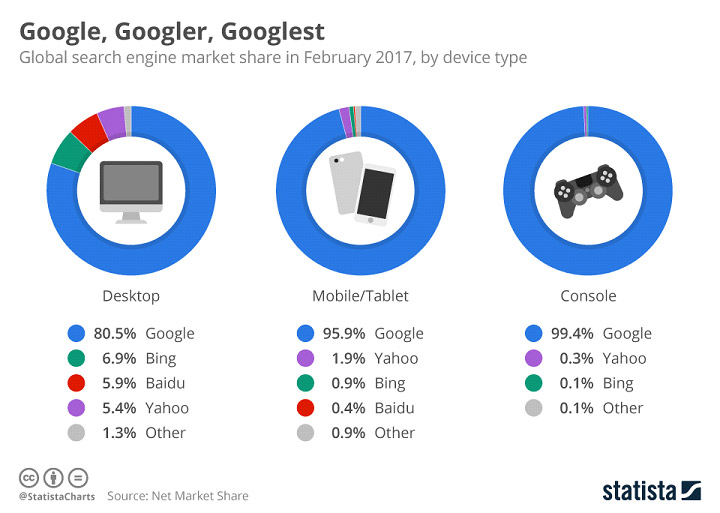
Table of Contents
- Introduction
- Get familiar with the Google Ranking Algorithm
- Make sure to do your keyword research
- Take care of On Page Optimisation
Introduction
The solution to most of our queries, we believe, lies with Google. And that’s because this search engine has established that authority to become the go-to place for all our questions. And this is exactly why Google has the first place in the rankings list occupying more than 80% market share for desktop and a whopping 95.9% for mobile devices.

So we already know that higher rankings can help you get more visibility and establish you as an online leader. However, the road to ranking higher in the search engines is filled with immense competition. So what can you do to get the required boost?
Get familiar with the Google Ranking Algorithm
75% of user clicks go to the first page of Google search results. And almost all webmasters are competing for that space.
Before you set out on your quest to rank higher in the search results, it is crucial to know what really goes into improving your visibility on the search engine. Which is why you must understand how the Google Ranking Algorithm works.
For a long-term success, you need to stay updated with the changes Google rolls out every year, especially the major ones since these dictate
Take its recent mobile-first indexing update. With this shift, mobile websites which aren’t mobile ready will likely get demoted in the search rankings. So it makes sense to actually understand the algorithm before taking the necessary steps to rank higher, the steps which we will explore below:
Make sure to do your keyword research
Whether you already own a website or have just started out, the first and foremost step is to gather your keyword list. Keywords help you unlock the further stages in search engine optimisation and help you rank higher.
Use a Keyword Finder Tool to identify the relevant keywords. Build your list of keywords which you can then employ in content as well as website components.
Another way to get a ranking boost is to analyse what is working for your competitors (ones with higher online authority) and use that knowledge to gain more keyword ideas. To do this, go to the Google Keyword Planner and copy the competitor’s site link in the search box. Now move onto the Keyword ideas tab.
Take care of On Page Optimisation
Key your words in the Title Tag
Title tags can help you climb the search engine ladder so long as you ensure that they are optimised. By optimisation, we mean that the title should not be longer than 40-50 characters, it should include the primary keyword you are targeting and your company name, especially for the product/service pages.
It is essential to provide clarity through the title tag about what the page is about and at the same time, it is equally important to make it unique. But remember not to overstuff the keywords. Also, title tags that start with the keyword tend to perform better than tags with keywords in the end.
Make your URL SEO Optimised
Consider a scenario where a user lands on your page, finds your content useful and shares the link with a friend. This person doesn’t want to open the link because the URL is very vague and doesn’t give him any idea about the link. This pinpoints to the necessity of optimising the URLs, not just with the right keywords but an effective and short description.

Optimize your Media Uploads
Businesses rely heavily on multimedia (images, videos, GIFs etc) to engage their audience. And they really do have a positive effect on traffic and even conversions. However, these same media uploads do not make any sense to search engines unless optimised.
So when you are adding images or any other multimedia file to your website, it is crucial to optimise it to make it meaningful for the search engines. When adding images, make sure to not leave the ALT tags empty and remember to not exceed the optimal length of 50-60 characters.
Link Building
If you look at the top ranking websites, you would find a common thread between them – quality backlinks. Link building is an effective technique that helps businesses improve their visibility and earn more networking opportunities.
There are various ways of earning quality backlinks. One is by creating valuable content that people link back to. Another technique involves boosting User Generated Content. You can also acquire links if your offerings include useful tools that help your audience.
FAQs
What Is The Best Way To Improve Search Engine Ranking?
Creating high-quality content and indulging in best SEO practices are effective ways to improve your website’s search engine ranking. Target keywords should always be adequately optimized, whereas the intent of the content should be informative and value-driven. Here are some effective ways to improve your search engine rankings:
- Conduct thorough keyword research.
- Focus on creating high-quality, plagiarism-free, and well-researched content.
- Use social media platforms to drive traffic to your website. Post engaging, informative, and interesting content to attract your target audience.
- Optimize your images by adding relevant keywords in the file name and the alt text.
- Constantly measure your results and focus on optimizing existing content.
Can You Pay To Be At The Top Of Google?
No, you cannot pay Google to be at the top of their search results. Scammers use a popular myth to lure innocent and unsuspecting business owners into paying hundreds or thousands of dollars on the false pretext of helping them rank at the number one position.
Why Is My Website Not Ranking On Google?
There are many reasons why your website could not be ranking on Google.
Here are some popular ones to consider:
- Your website is new, and the Google bots and crawlers haven’t indexed the website yet.
- The website’s search visibility settings are preventing the website from getting indexed by Google.
- The content is not indexed and has no index meta robot tags that prevent Google from indexing your web pages for ranking purposes.
- Your website is not optimized for search engines and has pressing technical issues.
- Your website has been penalized by Google for using black hat SEO techniques.
Why Has My Website Ranking Dropped?
Here are some reasons why your website rankings might have dropped:
- There has been a Google algorithm update; sometimes, these updates can temporarily cause websites to lose their ranking.
- In case competition has recently increased, chances are that your competitors are competing to rank higher than you.
- Your website has undergone changes, including redesigning, changes to content, etc.
- Google has penalized your website for violating the guidelines of the webmaster.








